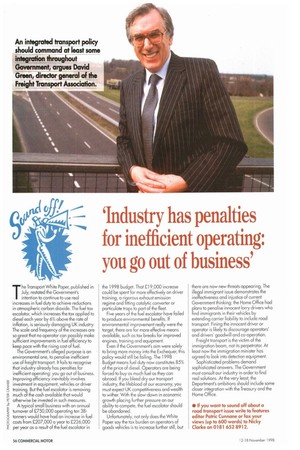'Industry has penalties for inefficient operating: you go out of business'
Page 58

If you've noticed an error in this article please click here to report it so we can fix it.
The Transport White Paper, published in July, restated the Government's intention to continue to use real increases in fuel duty to achieve reductions in atmospheric carbon dioxide. The fuel tax escalator, which increases the tax applied to diesel each year by 6% above the rate of inflation, is seriously damaging UK industry. The scale and frequency of the increases are so great that no operator can possibly make sufficient improvements in fuel efficiency to keep pace with the rising cost of fuel.
The Government's alleged purpose is an environmental one, to penalise inefficient use of freight transport. It fails to recognise that industry already has penalties for inefficient operating: you go out of business. Improving efficiency inevitably involves investment in equipment, vehicles or driver „ training. But the Fuel escalator is removing ai much of the cash available that would
g--' otherwise be invested in such measures.
-°: A typical small business with an annual E turnover of £750,000 operating ten 38itonners would have had an increase in fuel I8' costs from £207,000 a year to £226,000 E per year as a result of the fuel escalator in
the 1998 budget. That £19,000 increase could be spent far more effectively on driver training, a rigorous exhaust emission regime and fitting catalytic converter or particulate traps to part of the fleet. Five years of the fuel escalator have failed to produce environmental benefits. If environmental improvement really were the target, there are far more effective means available, such as tax breaks for improved engines, training and equipment. Even if the Government's aim were solely to bring more money into the Exchequer, this policy would still be failing. The 1998 Budget means fuel duly now constitutes 85% of the price of diesel. Operators are being forced to buy as much fuel as they can abroad. If you bleed dry our transport industry, the lifeblood of our economy, you must expect UK competitiveness and wealth to wither. With the slow-down in economic growth placing further pressure on our fu ability To compete, the el escalator should be abandoned.
Unfortunately, not only does the White Paper say the tax burden on operators of goods vehicles is to increase further still, but
there are now new threats appearing. The Merl immigrant issue demonstrates the ineffectiveness and injustice of current Government thinking: the Home Office had plans to penalise innocent lorry drivers who Find immigrants in their vehicles by extending carrier liability to include road transport. Fining the innocent driver or operator is likely to discourage operators' and drivers' goodwill and co-operation.
Freight transport is the victim of the immigration boom, not its perpetrator. At least now the immigration minister has agreed to look into detection equipment. Sophisticated problems demand sophisticated answers. The Government must consult our industry in order to find real solutions. At the very least, the Department's ambitions should include some closer integration with the Treasury and the Home Office.
• If you want to sound off about a road transport issue write to features editor Patric Cunnane or fax your views (up to 600 words) to Nicky Clarke on 0181 652 8912.




















































































































